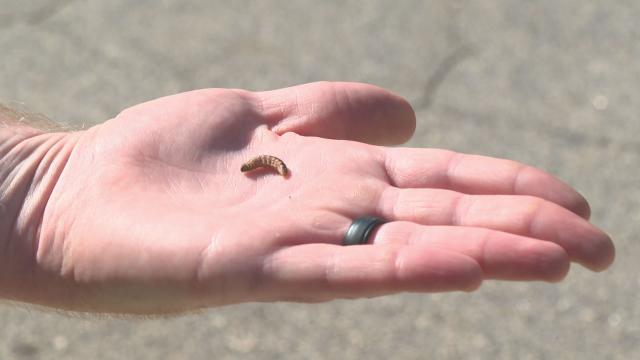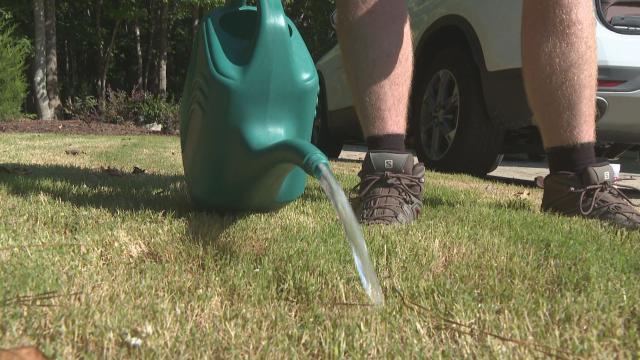- U.S.-based aid groups rush to get supplies into storm-battered Jamaica after Hurricane Melissa
- Travelers stuck in Jamaica due to Hurricane Mellissa forced to pay for unwanted extended stay
- Raleigh police officer awaits word from family in Jamaica after Hurricane Melissa devastation
- North Carolina’s leaders give insight on the effects of Hurricane Melissa
- ‘We want some answers;’ Whiteville residents demand city response to prevent flooding
Armyworms brought by Tropical Storm Debby wreaking havoc on homeowners

Armyworms have many homeowners upset about costly damage to their beautiful green lawns.
Armyworms, known scientifically as spodeotera frugiperda, are a species of caterpillar commonly associated with foliar damage seen on grass and home landscapes.
The infestation caught homeowners, like Lee Hawkins of Fuquay-Varina, by surprise.
“This just happened Sunday that we started seeing it and the whole front yard is shot,” he said.
According to the College of Agriculture, Forestry and LIfe Sciences at Clemson University, adult moths can lay up to 1,000 eggs in a single night and lay them around desirable food sources, such as fenceposts and house sidings.
Hawkins and his neighbors spend a lot of money to keep the problem from happening. However, the pests are selective.
“As you go through the neighborhood, you’ll see one yard has it, the next one doesn’t,” Hawkins said.
Turf management specialist Don Fitzgerald says he’s never seen it this bad.
“When you get them they pretty much will go across your lawn, you know, munch on the grass and it’s an army of them,” he said.
NC State’s Terri Billeisen, an NC State entomologist, says tropical storms, like Tropical Storm Debby, play a role.
“We tend to see those moth numbers increase very quickly, and I think that’s what happened here in the last couple of weeks since tropical storm Debby came through,” she said.
Once the armyworms land, they burrow into the soil, eating grass roots. In the early morning, several are eating and moving in large numbers, hence the “army” name.
Fitzgerald says there are cost-effective ways to minimize the damage to your home.
“If you see those on your foundation at nighttime, you can easily pluck them off your foundation and put them in a soapy water bucket,” he said.
Soapy water also brings the worms to the surface, where they are vulnerable. Billeisen recommends a water and dish detergent mixture, which brings them above ground.
“One to two tablespoons in a gallon of water and apply to an area adjacent to the damage,” she said.
Fitzgerald recommends that homeowners turn off floodlights at night because they attract the armyworms, and that’s where they may lay their eggs.
What’s left once the infestation is gone is repairing the damage and restoring the lawn.
“We’re about two to three weeks away from starting over seed, and we’ll be able to replenish your grass. The Whole industry will be able to replenish your grass for you,” Fitzgerald said.

